人教版七年级下册英语语法综合复习题
人教版七年级英语下册:第十一单元短语语法归纳练习(含答案)
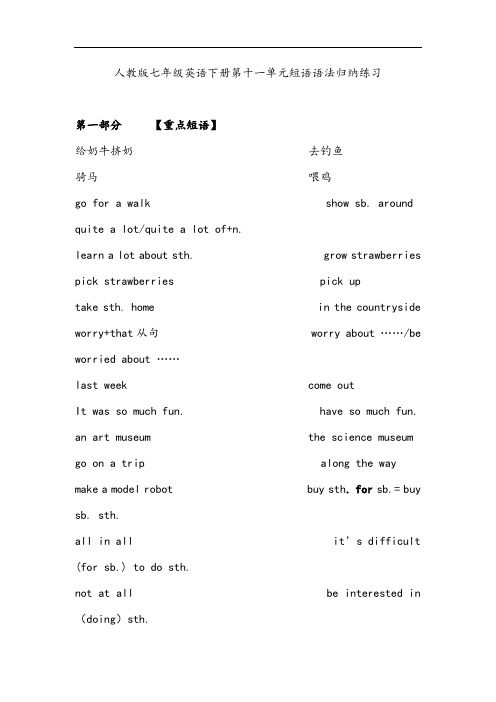
人教版七年级英语下册第十一单元短语语法归纳练习第一部分【重点短语】给奶牛挤奶去钓鱼骑马喂鸡go for a walk show sb. aroundquite a lot/quite a lot of+n.learn a lot about sth. grow strawberriespick strawberries pick uptake sth. home in the countrysideworry+that从句 worry about ……/beworried about ……last week come out It was so much fun. have so much fun. an art museum the science museumgo on a trip along the waymake a model robot buy sth. for sb.= buysb. sth.all in all it’s difficult(for sb.) to do sth.not at all be interested in(doing)sth.【答案】从左至右:milk a cow; go fishing; ride a horse; feed chickens; 去散步=take a walk;带领某人参观;相当多的;关于…学到很多;种草莓;摘草莓;捡起/接某人;带…回家; 在农村;担心……; 担心某人某事;上周;出来/出版/开花;如此有趣;玩得非常开心;一个艺术博物馆;科学博物馆;去旅行;沿途;制作一个机器人模型;为某人买某物;总之;对某人来说做某事很困难;根本不/一点也不;对(做)…感兴趣第二部分【重点语法】一、一般过去时1.定义一般过去时表示过去某个时间或一段时间内发生的动作或状态;也可表示过去经常或反复发生的动作。
e.g.I got up at 7:00 yesterday. 我昨天7点起床。
人教版七年级下册英语Unit 1 重难点与语法专项练习题(含答案)

人教版七年级下册英语Unit 1 重难点与语法专项练习题题组训练一speak/tell/talk/say辨析★ speak用作及物动词时,意为“说(某种语言)”,其后常接表示语言的名词作宾语。
如:He can’t speak Chinese.他不会讲中文。
★tell意为“讲述;告诉”时为及物动词,可接双宾语,即构成tell sb.sth/ tell sth.to sb.结构,意为“告诉某人某事”。
如:Tell me your phone number again. = Tell your phone number to me again.再告诉我一遍你的电话号码。
★talk作动词,意为“说话;交谈”,强调交谈的动作,常用于talk to/ with sb.( about sth.)结构,表示“与某人谈论(某事)”。
如:She often talks with her friends about their homework.她经常和她的朋友们谈论家庭作业。
★say表示“说话”时强调说话的内容。
如:She says nothing to me about it.关于这件事她什么也没有对我说。
I.单项选择。
( )1. Please tell her some bread.A. buyB. buyingC. buysD. to buy ( )2. What does Mike in the letter?A.sayB. talkC. speakD. tell ( )3. -Can Mary Chinese?- No, she can't.A.sayB. speakC. tell D talk ★.根据汉语意思完成句子,每空一词。
4.你能告诉我你的QQ号吗?Could you your QQ number?5.下课后,她经常和她的朋友们交谈。
She often her friends after class.题组训练二and/but/or辦析★and意为“和;又”,表示并列、承接、递进关系。
人教版七年级下册英语语法练习题整理归纳
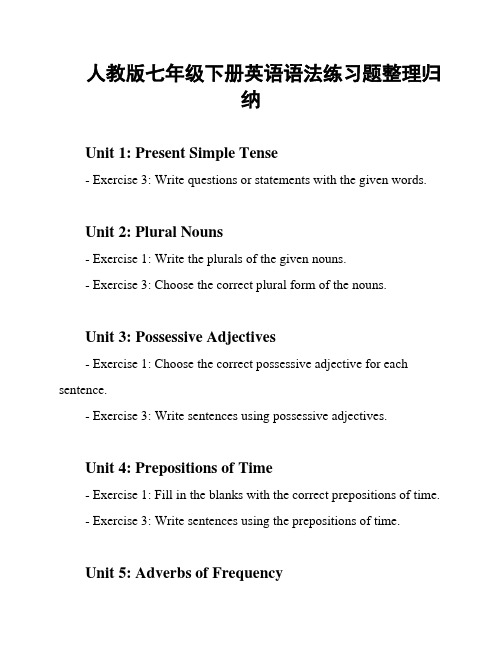
人教版七年级下册英语语法练习题整理归纳Unit 1: Present Simple Tense- Exercise 3: Write questions or statements with the given words.Unit 2: Plural Nouns- Exercise 1: Write the plurals of the given nouns.- Exercise 3: Choose the correct plural form of the nouns.Unit 3: Possessive Adjectives- Exercise 1: Choose the correct possessive adjective for each sentence.- Exercise 3: Write sentences using possessive adjectives.Unit 4: Prepositions of Time- Exercise 1: Fill in the blanks with the correct prepositions of time.- Exercise 3: Write sentences using the prepositions of time.Unit 5: Adverbs of Frequency- Exercise 1: Choose the correct adverb of frequency for each sentence.- Exercise 3: Write sentences using adverbs of frequency.Unit 7: Present Continuous Tense- Exercise 3: Write questions or statements with the given words.Unit 8: Adjectives- Exercise 3: Write sentences using adjectives.Unit 9: Countable and Uncountable Nouns- Exercise 1: Fill in the blanks with the correct form of the nouns in brackets.- Exercise 3: Write sentences using countable and uncountable nouns.Unit 10: Imperatives- Exercise 2: Rewrite the sentences using imperatives.- Exercise 3: Write instructions using imperatives.Unit 11: Simple Past Tense- Exercise 3: Write questions or statements with the given words.Unit 12: Possessive Pronouns- Exercise 3: Write sentences using possessive pronouns.Unit 13: Prepositions of Place- Exercise 1: Fill in the blanks with the correct prepositions of place.- Exercise 3: Write sentences using the prepositions of place.Unit 14: Adverbs of Manner- Exercise 1: Choose the correct adverb of manner for each sentence.- Exercise 3: Write sentences using adverbs of manner.Unit 16: Future Time- Exercise 1: Fill in the blanks with the correct form of the verbs in brackets.- Exercise 3: Write questions or statements with the given words.Unit 17: Indirect Questions- Exercise 1: Rewrite the sentences as indirect questions.- Exercise 3: Write sentences using indirect questions.Unit 18: Past Continuous Tense- Exercise 3: Write questions or statements with the given words.Unit 19: Adjectives and Adverbs- Exercise 1: Choose the correct form of the adjectives or adverbs in brackets.- Exercise 3: Write sentences using adjectives and adverbs.Unit 20: Modal Verbs- Exercise 3: Write sentences using modal verbs.。
11.人教版七年级下册语法专项练习题一(一般现在时,一般过去式,现在进行时)
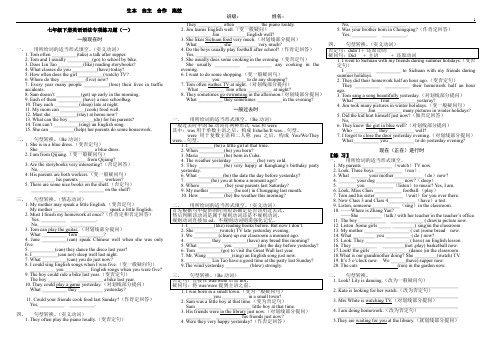
七年级下册英语语法专项练习题(一)一般现在时一、用所给词的适当形式填空。
(实义动词)1. Tom often __________(take) a talk after supper.2. Tom and I usually __________(go) to school by bike.3. Does Lin Tao __________(like) reading storybooks?4. What classes do you __________(have) today?5. How often does the girl __________(watch) TV?6. Where do they __________(live) now?7. Every year many people __________(lose) their lives in trafficaccidents.8. Sam doesn’t __________(get) up early in the morning.9. Each of them __________(have) a nice schoolbag.10. They each __________(sleep) late at night.11. My mom can __________(cook) food well.12. Must she __________(stay) at home now?13. What can the boy __________(do) for his parents?14. Tom can’t __________(sing) an English song.15. She can __________(help) her parents do some housework.二、句型转换。
(Be动词)1. She is in a blue dress.(变否定句)She __________ __________ a blue dress.2. I am from Qijiang.(变一般疑问句)__________ __________ from Qijiang?3. Are the storybooks very interesting?(否定回答)No, __________ __________.4. His parents are both workers.(变一般疑问句)__________ his parents __________ workers?5. There are some nice books on the shelf.(否定句)__________ _____ __________ on the shelf?三、句型转换。
2024年中考英语一轮复习人教版七年级下册9-12单元+语法汇总练习

中考复习人教版七下9-12一、词汇肉牛肉鸡肉鸡蛋鱼肉鸭肉猪肉羊肉火腿蔬菜卷心菜胡萝卜西红柿洋葱面条饺子面包蛋糕汉堡米饭汤答案肉牛肉鸡肉鸡蛋鱼肉鸭肉猪肉羊肉火腿蔬菜卷心菜Meat beef chicken egg fish duck pork mutton ham vegetable cabbage 胡萝卜西红柿洋葱面条饺子面包蛋糕汉堡米饭汤carrot tomato onion noodles dumpling bread cake hamburger rice soup二、语法1. would like/love 意为“想要”2.选择疑问句3.可数名词和不可数名词4.some,any5.something,anything,nothing答案1. would like/love 意为“想要”would like sth./ to do sth.想要某物/做某事。
Would you like sth.?你想要……吗?(客气请求)肯定回答:Yes, please.否定回答: No, thanks.Would you like to do sth.?你愿意做某事吗?(表示邀请建议)肯定回答:Yes, I’d love/ like to.否定回答:Sorry, I’d love to, but…(陈述具体理由)。
4.选择疑问句结构为“一般疑问句+or+选择部分”,选择疑问句要从中选择一种情况来回答。
5.可数名词和不可数名词可数名词bowls, apples, carrots, oranges, strawberries不可数名词beef, meat, milk, mutton, water可数名词和不可数名词chicken, salad, ice-cream, cabbage, cake可数名词:可数名词有单数、复数之分。
其复数形式一般要加-s或-es。
不可数名词没有复数形式,只有单数形式。
不可数名词表示数量的多少时,必须与表示数量的名词连用,即“数词+ 表示数量的名词(可数名词)+ of + 不可数名词”。
人教版英语七年级下册语法归纳习题及答案
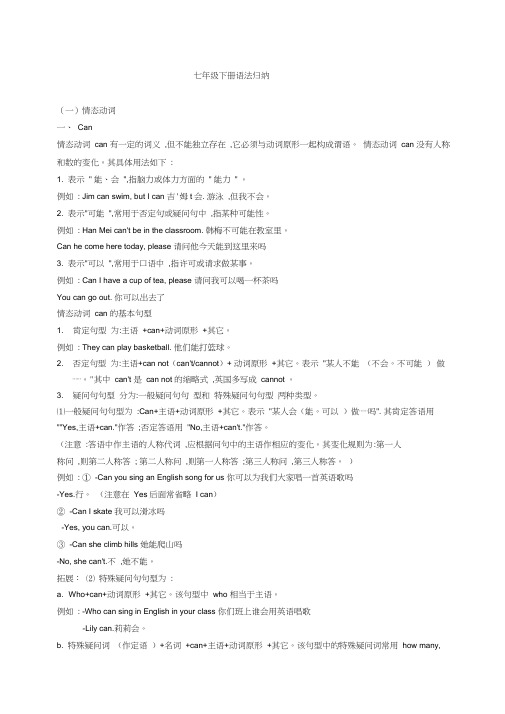
七年级下册语法归纳(一)情态动词一、Can情态动词can 有一定的词义,但不能独立存在,它必须与动词原形一起构成谓语。
情态动词can 没有人称和数的变化。
其具体用法如下:1. 表示" 能、会",指脑力或体力方面的" 能力" 。
例如: Jim can swim, but I can 吉'姆t会. 游泳,但我不会。
2. 表示"可能",常用于否定句或疑问句中,指某种可能性。
例如: Han Mei can't be in the classroom. 韩梅不可能在教室里。
Can he come here today, please 请问他今天能到这里来吗3. 表示"可以",常用于口语中,指许可或请求做某事。
例如: Can I have a cup of tea, please 请问我可以喝一杯茶吗You can go out. 你可以出去了情态动词can 的基本句型1. 肯定句型为:主语+can+动词原形+其它。
例如: They can play basketball. 他们能打篮球。
2. 否定句型为:主语+can not(can't/cannot)+ 动词原形+其它。
表示"某人不能(不会。
不可能)做⋯⋯。
"其中can't 是can not 的缩略式,英国多写成cannot 。
3. 疑问句句型分为:一般疑问句句型和特殊疑问句句型两种类型。
⑴一般疑问句句型为:Can+主语+动词原形+其它。
表示"某人会(能。
可以)做⋯⋯吗". 其肯定答语用""Yes,主语+can."作答;否定答语用"No,主语+can't."作答。
(注意:答语中作主语的人称代词,应根据问句中的主语作相应的变化。
其变化规则为:第一人称问,则第二人称答; 第二人称问,则第一人称答;第三人称问,第三人称答。
人教版七年级英语下册:第七单元短语语法归纳练习(含答案)

人教版七年级英语下册第七单元短语语法归纳练习第一部分【重点短语】问天气句型: =How’s it going? How’s everything going?Sounds like have a good timetake a message for sb. tell sb (not) to do sth call sb back No problemsome of my friends I am happy to see yousit by the pool orange juicerelax oneself right nowmy phone isn’t wo rking. talk on the phone write(a letter) to sb just right for +doing take a photo of sb by the pooldrink orange juice study hardon(a) vacation in the mountainsin the rainy weathervisit visitorrelaxed(形容人) relaxing(形容物)Europe European Russian Russiaisn’t working =doesn’t work= is brokensnow snowyrain rainy第二部分【重点语法】1.How’s the weather?= What’s the weather like?询问“天气怎么样?”回答常用:It is + 形容词。
(It’s sunny/rainy/windy/cloudy/snowy)2.How’s it going? 问候语,翻译为“最近怎么样?”也也可以说How’s everything going? 都是询问最近怎么样的意思。
回答常用:Not bad/Great/Terrible等3.Sounds like + 从句“听起来好像……”Sounds like you’re having a good time. 听起来好像你正玩得开心。
人教版七年级英语下册:第十一单元短语语法归纳练习含答案
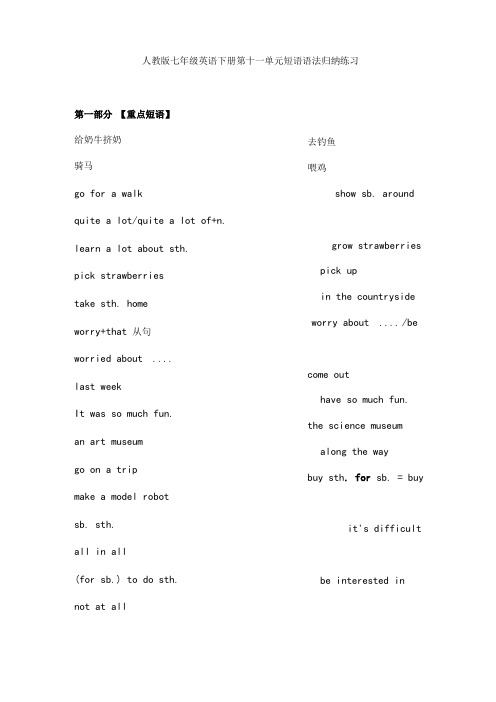
人教版七年级英语下册第十一单元短语语法归纳练习第一部分【重点短语】给奶牛挤奶骑马go for a walkquite a lot/quite a lot of+n. learn a lot about sth.pick strawberriestake sth. homeworry+that 从句worried about ....last weekIt was so much fun.an art museumgo on a tripmake a model robotsb. sth.all in all(for sb.) to do sth.not at all 去钓鱼喂鸡show sb. aroundgrow strawberries pick upin the countryside worry about .... /become outhave so much fun. the science museumalong the waybuy sth. for sb. = buyit's difficultbe interested in(doing) sth.【答案】从左至右:milk a cow; go fishing; ride a horse; feed chickens;去散步=t2卜《a walk;带领某人参观;相当多的;关于… 学到很多;种草莓;摘草莓;捡起/接某人;带…回家;在农村;担心……;担心某人某事;上周;出来/出版/开花;如此有趣;玩得非常开心;一个艺术博物馆;科学博物馆;去旅行;沿途;制作一个机器人模型;为某人买某物;总之;对某人来说做某事很困难;根本不/一点也不;对(做)…感兴趣第二部分【重点语法】一、一般过去时1.定义一般过去时表示过去某个时间或一段时间内发生的动作或状态;也可表示过去经常或反复发生的动作。
e.g.I got up at 7:00 yesterday.我昨天7 点起床。
2020-2021学年人教版初中英语七年级下册语法综合训练习题(含答案)
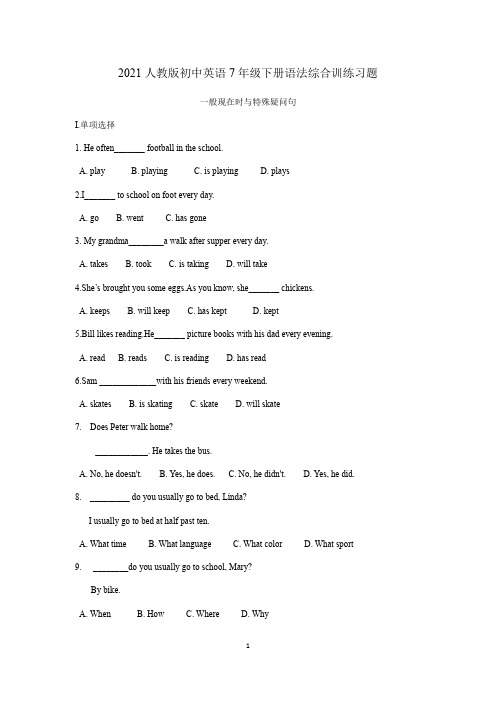
2021人教版初中英语7年级下册语法综合训练习题一般现在时与特殊疑问句I.单项选择1. He often_______ football in the school.A. playB. playingC. is playingD. plays2.I_______ to school on foot every day.A. goB. wentC. has gone3. My grandma________a walk after supper every day.A. takesB. tookC. is takingD. will take4.She’s brought you some eggs.As you know, she_______ chickens.A. keepsB. will keepC. has keptD. kept5.Bill likes reading.He_______ picture books with his dad every evening.A. readB. readsC. is readingD. has read6.Sam _____________with his friends every weekend.A. skatesB. is skatingC. skateD. will skate7.---Does Peter walk home?----____________. He takes the bus.A. No, he doesn't.B. Yes, he does.C. No, he didn't.D. Yes, he did.8.---_________ do you usually go to bed, Linda?---- I usually go to bed at half past ten.A. What timeB. What languageC. What colorD. What sport9.----________do you usually go to school, Mary?----By bike.A. WhenB. HowC. WhereD. Why10.---_______ does it take you to go to the park by taxi?-----About 30 minutes.A. HowB. How farC. How longD. How manyII.用括号中所给词的适当形式填空,必要时可加上助动词。
语法综合练习100题七年级英语下册单元重难点易错题精练(人教版)

期末复习之单元语法综合练习100题(Units 1-12)Unit 1 情态动词can的用法Unit 2 频度副词Unit 3 how引导的特殊疑问句Unit 4 语法Grammar 祈使句,must和have toUnit 5 Grammar语法why、what、where 引导的特殊疑问句Unit 6 现在进行时Unit 7现在进行时和一般现在时的区别Unit 8 there be句型Unit 9外貌描述句型Unit 10 Would like句型和名词的数Unit11-12一般过去时态1.—Alice, ________ you sing English song?—Yes, I can.A.can B.should C.must2.—Tony, ________ you sing English songs?—Yes, I can.A.must B.may C.can3.— Sir, could I feed the bears at Nantong Wild Forest Zoo?— Sorry, I am afraid you ________.A.can’t B.shouldn’t C.needn’t D.couldn’t4.—Could you go to the bookshop with me? I want to buy a book called “Alice in Wonderland”. —Sorry, I ________. My mother told me to go home right after school.A.couldn’t B.can’t C.mustn’t D.needn’t5.—Oh no, I took the wrong bus. ________ I get off now?—Sorry. The bus is moving, and you have to get off at the next bus stop.A.Can B.Should C.Must6.Lucy gets up early every weekday. So she ________ misses the bus.A.always B.never C.usually D.sometimes7.Cathy is ________ late for school because she gets up early every day.A.always B.usually C.sometimes D.never8.Li Hong is ________ late for class. She is always the first to come to school.A.sometimes B.usually C.often D.never 9.—Mr. Wang ________ gets up early.—Yes, so he is ________ late for work.A.always; always B.always; neverC.always; often D.never; never10.—Does your younger brother play computer games?—No, he ________ plays them. He always reads books about science.A.sometimes B.often C.never D.usually 11.Rick gets up early every day and he’s ________ late for school.A.always B.never C.usually D.sometimes 12.Mary ________ wears black clothes. She doesn’t like black.A.usually B.often C.sometimes D.never 13.Ted is a good student. He is ________ late for school.A.sometimes B.always C.often D.never 14.Mr Brown ________ does sports. It’s not good for his health.A.always B.often C.never D.usually 15.—Helen is a top student and very good at English.—Yes. That’s because she ________ reads English in the morning.A.always B.sometimes C.seldom D.never 16.— ________ are the strawberries?— 20 yuan a kilo. ________ strawberries would you like?A.How many; How many B.How much; How much C.How much; How many 17.— ________ is the weather in Beijing?—________ cloudy.A.What;It’s B.How;It’s C.How;It D.What;It 18.—________ does it take you to get there?—About twenty minutes.A.How many B.How much C.How far D.How long 19.—_________?—It’s about 10 minutes’ walk.A.How do you get to the libraryB.How long does it take to get to the libraryC.How far is it from your home to the library20.—________ did the new bike cost your father?—He paid 800 yuan for it.A.How many B.How long C.How much D.How far 21.________ talk with your classmates in class. It’s not good.A.Don’t B.No C.Let’s D.Not 22.________ park here when you see the sign.A.No B.Not C.Won’t D.Don’t 23.________ here on time next time, or you’ll be punished.A.Be B.Being C.To be D.Been 24.________ this kind of peach, and you will like it.A.To try B.Trying C.Tried D.Try 25.If God closes a door in front of you, there ________ be a window opened for you.A.can B.may C.must26.It is half past seven. You ________ go to school, or you’ll be late.A.can B.can’t C.mustn’t D.must 27.The dictionary ________ be Mary’s. Her name is on it.A.must B.can’t C.need 28.They ________ wear their school uniforms.A.don’t have to B.aren’t have to C.haven’t to 29.—Tony, let’s see the movie The Batman on Friday night.—Sorry, I can’t. I ________ help mom do the dishes.A.mustn’t B.can C.have to 30.Jim, you ________ finish the work now. You can do that in the afternoon.A.have to B.must C.don’t have to 31.—________ do you usually go shopping?— On Sundays.A.When B.How C.Why D.Where32.—________ is it in New York?—It’s nine o’clock in the morning.A.What time B.What colorC.When D.What subject33.—________ is it in Sydney?—It’s nine thirty in the morning.A.What time B.What day C.What rule D.What color 34.—________ are they doing?—They’re ________.A.What; run B.Who; runningC.What; running D.Where; running35.—________ is your teacher from?—He is from Henan Province.A.When B.Where C.Why D.How 36.—________ are you doing that?—Because I want to tell him doing like that is dangerous.A.How B.What C.Why D.Which 37.—________ do you like Miss Sun?—Because her classes are very interesting.A.What B.Who C.How D.Why 38.—____________ is the weather like in your city today?—It is snowing heavily. My family and I all stay at home.A.How B.What C.Who D.Where 39.—Teddy, ________ is the man wearing a hat over there?—He is my father.A.what B.who C.how D.where 40.— ________ do you want to be when you grow up?— I want to be an astronaut like Wang Yaping.A.Where B.How C.What D.When 41.—________ Mary ________ her homework?—No, she is helping her mom with the housework.A.Does;do B.Is;doC.Does;doing D.Is;doing42.—The party is beginning. Where is Peter now?—Oh, he can’t come. He ________ for a test at home.A.studies B.study C.studied D.is studying43.Look! Henry ________ lots of photos on the Great Wall.A.are taking B.take C.is taking D.takes44.—________ she ________ her homework?—No, she isn’t. She is writing something.A.Does; do B.Is; doing C.Doesn’t; do D.Are; doing45.My grandma often makes jiaozi. Look! She ________ jiaozi for us.A.is making B.makes C.make46.I clean my room every day. But now I ________ TV.A.am watching B.watching C.watch D.watches47.It ________. Let’s wait here and go home later.A.rains B.rained C.is raining D.rain48.—Pardon? I can not hear you well on the phone.—Oh, my family ________ in Wenfeng City Square. There are so many people here.A.are shopping B.shops C.is shopping D.shop49.—Look, mom ________ soup in the kitchen.—Oh, she always ________ delicious soup for us.A.makes; is making B.makes; make C.is making; makes D.is making;made50.The library is ________ every day. It ________ at 9: 00 in the morning.A.open; open B.opened; opens C.open; opens51.My uncle usually ________ water after dinner, but now he ________ tea.A.drinks; drinks B.drinks; is drinkingC.is drinking; drinks D.is drinking; is drinking52.—Does Ella like ________?—Yes. She often ________ things from the stores.A.shop; buys B.shop; is buyingC.shopping; buys D.shopping; is buying53.Bob ________ basketball and he looks ________ his father.A.likes, like B.like, likes C.likes, likes D.like, like54.There ________ any schools in the village before, but now there ________ two.A.wasn’t; were B.weren’t; was C.weren’t; are55.—Look out of the window! It ________ now.—Yes. It often ________ here in winter. But I like ________ days, because I like make snowmen with friends.A.snows; is snowing; snowy B.snow; is snowing; snow’sC.is snowing; snows; snow D.is snowing; snows; snowy56.My aunt and uncle always _________ a walk in the park in the morning.A.takes B.take C.are taking D.will take57.—Bill is only 2 years old. He ________ reading.—He usually ________ picture books with his dad in the morning.A.like; read B.likes; read C.like; reads D.likes; reads58.—Where is John?—He ________ in the library. He often ________ there in the afternoon.A.reads; reads B.is reading; readsC.reads; is reading D.is reading; is reading59.Daming ________ English every day. Listen! He ________ an English song.A.learns; sings B.is learning; sings C.learns; is singing D.is learning; is singing 60.Bill’s mother likes ________ and she always ________ in the library.A.read; reads B.reading; readsC.reading; read D.read; read61.There _______ a lot of new furniture and three beautiful pictures in the room.A.have B.are C.has D.is62.There’re ______ in the fridge. Let’s go to the supermarket and buy some.A.some fruit B.little meatC.a few eggs D.few vegetables63.There ______ a pen and some pencils on the desk.A.has B.is C.have D.are64.Look! There ________ two cats on the floor.A.are B.is C.am D.be65.—I am really busy on weekends because homework takes a lot of time. There is ________ report, two slideshow presentations and three projects to do this weekend.—At least they don’t sound boring.A.an one-page B.a one-page C.two page of D.two pages of66.There ________ some ice cream in the fridge.A.is B.are C.have D.has67.There ________ some soup in the small bowl and there ________ some onions in the large bowl.A.is; is B.are; are C.is; are D.are; is68.—There ________ a library and two reading rooms in our school.—Wonderful! And there ________ juice on sale in the book store.A.are;is B.is;are C.are;are D.is;is69.There ________ an apple and two potatoes on the desk.A.has B.have C.are D.is70.There ________ a set of keys on the desk. Some books ________ on the desk, too.A.are; are B.is; are C.are; is71.—Can you tell me ________?—Sure, he’s tall and thin, and he has curly blond hair.A.what does Tom look like B.what your brother looks likeC.who’s your brother D.what Mr. Green likes72.There ________ two dictionaries and a storybook in the bag.A.is B.has C.are D.have73.Linda ________ tall and she ________ long curly hair.A.has; is B.has; has C.is; is D.is; has74.—What does Sally look like?—She ________ of medium height, and she ________ long straight hair.A.is; is B.is; has C.has; has D.has; is75.Clark his father and his father very young.A.looks; looks B.looks like; looks C.looks; looks like D.looks like; looks like 76.Hurry up!Some _____ and ____ are on sale in the supermarket.A.tomato; egg B.tomatoes; eggC.tomatoes; eggs D.tomato; eggs77.There isn’t _________ milk at home now. How about going to the supermarket to get ________?A.any;any B.any; some C.some; some D.some; any 78.Let’s buy two ________. I’d like some ________ for lunch.A.fish; fishes B.fishes; fishC.fish; fish D.fishes; fishes79.There is ________ water in this village.A.lots of B.some C.a lot of D.all the above 80.—What about some ________?—Good idea!A.orange juice B.orange juices C.oranges juice D.oranges juices 81.—I’d like some tea.—Sorry, we don’t have ________. Would you like ________ milk?A.some; some B.any; any C.some; any D.any; some 82.—Kate, what do you have for lunch?—I have some ________and________ .A.chicken; vegetable B.chicken; vegetablesC.chickens; vegetables D.chickens; vegetable83.—Would you like________football with us? —Sure. I like________football very much.A.play; to play B.playing; to play C.to play; playing D.playing; playing 84.—Guess what? The great movie is on (上映) in the cinema.—Nothing new. I ________ it last week.A.see B.will see C.saw85.My home town (故乡) ________ a beautiful park in the eastern (东部的) part last July.A.build B.builds C.built86.—Do you know anything about Jackson?—Yes, he was born in 1958 and ________ in 2009.A.is dying B.die C.died87.—Wow, you have made so much progress in drawing.—Thanks. I ________ two online courses this winter holiday.A.will take B.take C.took D.am taking88.Sportsmen from forty-five countries in Asia ________ to Hangzhou for the 19th Asian Games in Hangzhou last month.A.come B.came C.is coming D.has come89.Mary ________ the school just now.A.hurry to B.hurries to C.hurried to D.hurried90.—Hi, Linda. Are you writing _______ Tom?—Yes. I _______ him yesterday.A.to; heard out B.to; heard fromC.with; hear from D.from; hear out91.We all love _______ table tennis, and we _______ a good time playing it yesterday.A.playing; have B.to play; having C.playing; had D.play; had92.Last Christmas, Tommy’s father ________ him a new watch.A.give B.gave C.to give D.gives93.________ you a student last year?A.Are B.Was C.Were D.Do94.Jenny ________ TV every evening. But last night she ________.A.watches; didn’t B.watch; didn’t C.watched; didn’t D.watched; did95.—I bought an English-Chinese dictionary.—When and where ________ you ________ it?A.have; bought B.did; buy C.will; buy D.do; buy96.—Did you go ________ yesterday?—Yes, we ________ by the lake.A.camp; camped B.camped; camp C.camping; camped D.camped; camping97.—Who made the tomato and egg soup? It’s so delicious.—Aunt Amy ________.A.did B.was C.do D.does98.We ________ Xiangshan Park with our grandmother. We had fun there.A.are visiting B.visit C.will visit D.visited99.She used to ________ in a small village at the early age, but now she has been used to ________ in a big city.A.live;living B.living;live C.lived;living D.live;live100.—Did you ________ photos last week? —No, I ________.A.take; didn’t B.took; didn’t C.take; don’t D.took; don’t参考答案:1.A【详解】句意:——爱丽丝,你会唱英文歌吗?——是的,我会。
人教版七年级英语下册:第六单元短语语法归纳练习(含答案)
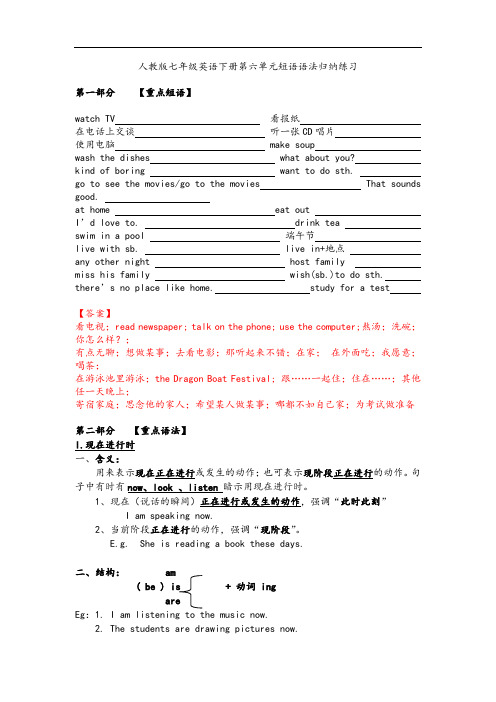
人教版七年级英语下册第六单元短语语法归纳练习第一部分【重点短语】watch TV 看报纸在电话上交谈听一张CD唱片使用电脑 make soupwash the dishes what about you?kind of boring want to do sth.go to see the movies/go to the movies That soundsgood.at home eat outI’d love to. drink tea swim in a pool 端午节live with sb. live in+地点any other night host familymiss his family wish(sb.)to do sth. there’s no place like home. study for a test【答案】看电视;read newspaper; talk on the phone; use the computer;熬汤;洗碗;你怎么样?;有点无聊;想做某事;去看电影;那听起来不错;在家;在外面吃;我愿意;喝茶;在游泳池里游泳;the Dragon Boat Festival; 跟……一起住;住在……;其他任一天晚上;寄宿家庭;思念他的家人;希望某人做某事;哪都不如自己家;为考试做准备第二部分【重点语法】1、现在(说话的瞬间)正在进行或发生的动作,强调“此时此刻”I am speaking now.2、当前阶段正在进行的动作,强调“现阶段”。
E.g. She is reading a book these days.二、结构: am( be ) is + 动词 ingareEg:1. I am listening to the music now.2. The students are drawing pictures now.3. Listen! She is riding a bike.三、时间标志词:现在进行时的时间状语有now, at present, at the moment, these days,【练习】I.写出下列动词的现在分词play________ sing ________ go_________ swim _________read________eat write________ have________ make_______ swim_________dance_______ live_________ ride live_______take_________come ________ put_________ cut run_________ sit _______ showII.用所给的动词的正确形式填空1.The boy __________________ ( draw)a picture now.2. Listen!Some girls _______________ ( sing)in the classroom .3. My mother _________________ ( cook )some nice food now.4. Look . They _______________( have) an English lesson .5.They ____________(not ,water) the flowers now.6.Look! The girls ________________(dance )in the classroom .7.What is our granddaughter doing? She _________(listen ) to music.8. It’s 5 o’clock now. We _____________(have)supper now.9.______Helen____________(wash )clothes? Yes ,she is.10. What _____ you ______ ( do ) now?【答案】1.is drawing 2.are singing 3.is cooking 4.are having 5.aren’t watering6.are dancing7.is listening8.are having9.Is washing 10.are doing五、结构变型①陈述句(肯定句)主语+be(am, is, are)+现在分词,I am running.②一般疑问句Be(Am, Is, Are)+主语+现在分词,-Is he (she) listening to music?-Yes, he (she) is. / No, he (she) isn't.③特殊疑问句疑问词+be (am, is, are)+主语+现在分词,-What are you doing?-I am doing my homework.④否定句主语+be(am, is, are)+not+现在分词I am not reading English.下面以talk为例来说明其各种句式。
人教版新目标七年级英语下册Unit10I’dlikesomenoodles语法篇试题含答案

人教版新目标七年级英语下册Unit10I’dlikesomenoodles语法篇试题熟练掌握本章重点语法知识。
There be句型There be句型的基本用法是表示“某地(或某时)有某人(或某物)”,其形式为“Therebe+代词或名词(短语)+地点/时间状语”。
这里there是引导词,没有词义,be是谓语动词,代词或名词(短语)是主语。
be要与主语保持人称和数的一致。
否定句是在be后加not;一般疑问句是将be放在句首;反意疑问句中的简短问句是由“be(或其否定式)+there”构成。
例如:1.There is a desk and two chairs in the room.(紧挨着be动词的主语是a desk,是单数,故be的形式要用is)2.There aren't two chairs and a desk in the room.(否定句)3.Is there anything wrong with your ears?(Yes,there is./No,there isn't.)4.There wasn't a meeting yesterday,was there?(反意疑问句)除此之外,还有一个重要句式“有某人在做某事”,要用“There be +sb.+doing sth.+地点/时间状语”。
例如:There are several children swimming in the river.河里有几个孩子在游泳。
There be 结构中常见的时态有如下几种情况:通过上表可知:各种时态的变化是通过 be动词的变化来体现的。
至于你提到的两个句子我们先不考虑对错,首要的问题是弄清楚There be与have所表示的意义。
There be句型表示“存在”关系,have表示“所属”关系,两者不能混合在一个句子中。
例如,要说“明天有一个班会。
”(1)There will have a class meeting tomorrow.(×)(2)There is going to/will be a class meeting tomorrow.(√)有时候既表示“存在”又表示“所属”时两种都可以用。
英语人教版七年级下册期末复习真题汇编卷语法填空25篇试卷及答案

In many places, people have birthday cakes ____53____ candles. The number of candles ____54____ (be) the person’s age. The birthday person must ____55____ (make) a wish and blow out the candles. If he or she ____56____ (blow) out all the candles in one go, the wish will come true. In the UK, people sometimes put a candy in a birthday cake. The child with the candy is ____57____ (luck).
Mrs. Davis is happy now because Banjo can help her. What a smart and helpful dog Banjo is! (2022·河北沧州·七年级校考期末)根据短文内容及所给提示,在文中空白处填写一个 正确单词或括号内单词的正确形式。
Do you know Canada? Now let’s get to ____26____ (know) it. It is one of the largest ____27____ (country) in the world. It’s in north ____28____ the U.S. The ____29____ (capital) is Ottawa. There ____30____ (be) about 37 million people. Many of them can speak two ____31____ (language)—English and ____32____ (France). Niagara Falls is famous all ____33____ the world. Canada’s flag has ____34____ leaf on it. It’s red. And its _____35_____ (nation) animal is beaver. I hope I can visit Canada one day.
初中英语人教新目标七年级下册Unit11语法练习(一般过去时的用法)(附参考答案)
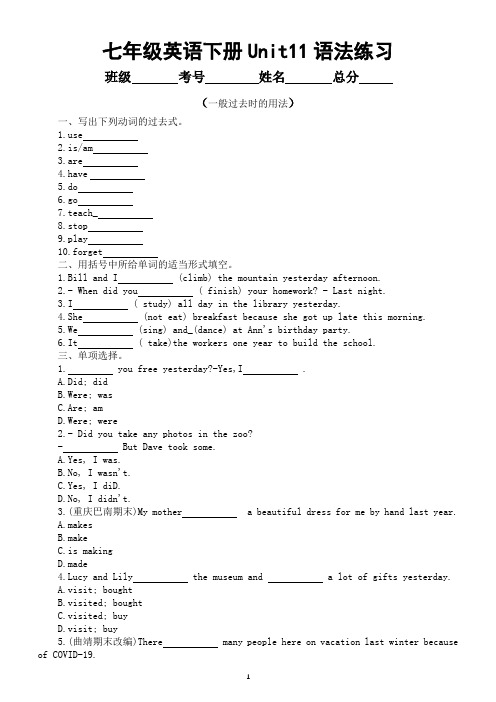
七年级英语下册Unit11语法练习班级考号姓名总分(一般过去时的用法)一、写出下列动词的过去式。
e2.is/am3.are4.have5.do6.go7.teach_8.stop9.play10.forget二、用括号中所给单词的适当形式填空。
1.Bill and I (climb) the mountain yesterday afternoon.2.- When did you ( finish) your homework? - Last night.3.I ( study) all day in the library yesterday.4.She (not eat) breakfast because she got up late this morning.5.We (sing) and_(dance) at Ann's birthday party.6.It ( take)the workers one year to build the school.三、单项选择。
1. you free yesterday?-Yes,I .A.Did; didB.Were; wasC.Are; amD.Were; were2.- Did you take any photos in the zoo?- But Dave took some.A.Yes, I was.B.No, I wasn't.C.Yes, I diD.D.No, I didn't.3.(重庆巴南期末)My mother a beautiful dress for me by hand last year.A.makesB.makeC.is makingD.made4.Lucy and Lily the museum and a lot of gifts yesterday.A.visit; boughtB.visited; boughtC.visited; buyD.visit; buy5.(曲靖期末改编)There many people here on vacation last winter because of COVID-19.A.wereB.wasC.aren'tD.weren't6.What a surprise(惊讶)to see you here! When you back?A.do; getB.did; getC.have; gotD.will; get四、句型转换。
最新人教版新目标英语七年级下册语法专项训练试题及答案

◆情态动词can,must与have to的用法一、用括号内所给词的适当形式填空1. I can't________ (play) chess with you. I have too much homework todo.2. —Can your parents________ (speak) English?—Yes, they can.3. What can your sister ________(do)?4. The boy works very hard. He ________(not watch) TV on schoolnights.5. I usually ________(go) to bed before 10:00 in the evening.二、单项填空1. —Tony, ________you sing English songs?—Yes, I can. (2017?北部湾经济区)A. canB. mayC. needD. must2. —Would you like another glass of water?—No, thanks. I __________ leave now. Tony is waiting for me. (2017?遵义)A. canB. mayC. must3. —Must I leave now? It's still raining hard outside.—No, you ________. You can wait till the rain stops. (2017?黔西南)A. don't have toB. couldn'tC. can'tD. shouldn't4. —Mum, may I go swimming now?—Yes, dear, but remember that you ________ go with your dad.(2017?福建)A. mayB. canC. must5. Don't be late for class. We ________ on time. (2017?攀枝花)A. can beB. must beC. may beD. will be三、根据汉语意思完成句子,每空一词1. 你妹妹会游泳吗?________your sister________?2. 凯特会做什么?________can Kate________?3. 艾丽斯不会下象棋。
七年级英语下册第三单元短语语法归纳练习题

七年级英语下册第三单元短语语法归纳练习题人教版七年级英语下册第三单元短语语法归纳练习第一部分【重点短语】get to school take the traintake the subway ride a bikehow far how longfrom home to school every day乘公共汽车(动词型)by bikeWalk to school run to schoolHave a good day think ofbetween…and…go on a ropeway cross the riverone 11-year-old boy play withcome true be afraid of sth.be like it takes sb. 时间to do sth. take…to…=go to……by…… It is one’s dream to do sth. thanks for doing sth.第二部分【重点语法】一、交通方式表达法1.动词型: take +限定词(a/an/the)+交通工具(单数)(take 译为乘坐,动词型通常放在句中)如:take a /the bus , take a/the subway, take a/the train例:Tom takes a bus to school.翻译(Linda坐地铁去图书馆):Linda library.◆有的交通工具不需要用take,如walk to/drive to /ride to/fly to/◆Walk to +地点=go to ...on foot走路去…如:I walk to school every day.=I go to school on foot.注意:如果后面接地点副词here , there , home 等介词to应省去2.介词型:1)by+交通工具(单数)(中间无任何修饰词,介词型通常位于句末)如:by bus/by subway/by train例:Tom goes to Beijing by train.2)in/on +限定词(a/an/the)+交通工具(单数)(位于句末,特别强调在自行车上用on)如:in a /the car, in a /the boat, in a/the taxiOn a /the bus, on a /the train, on a /the subway例:My father goes to work on a bus/in a car.注意:1.对交通工具提问用:how(怎样)如:My father goes to work on a bus(对划线部分提问)How does your father go to work?七年级英语下册第三单元短语语法归纳练习题【试一试】1. I think you can _____to the new park. It’s a little far.A. by busB. take a busC. on footD. walk2. –-How does your brother usually go to school?–- ______car.A. ByB. InC. OnD. With3. I often go to school _____ my father’s car and go back home ______ foot.A. in; onB. by; byC. by; inD. on; by4. Jim often goes to school ______ bike. But today he goes to school ______ the school bus.A. on; byB. by; byC. by; onD. on; on二、交通方式之间的互换。
Unit+1-+Unit+3+语法总结以及练习+2023-2024学年人教版七年级英语下册

人教版七年级英语下册unit1-unit3语法总结以及练习一、语法点总结:1.be good at擅长于做.2.介词+doing3.do well in+doing 介词:about,at, in on for,of +doing擅长于做.4.play+ the+西洋乐器;play+球类棋类5.can+do动词原形6.help sb.with sth帮助某人做某事7.be busy doing sth.忙于某事8.need sb.to do sth 需要某人去做某事9.be late for因…而到10.b e good for 对...有好处11.t hink of认为12.It takes sb十时间十如to do sth.花多长时同去做某事13.spend+时间+doing sth.某人花时同做某事13.It is +adj for sb+to do sth.对某人来说做某怎么样二.实战练习1.Wang Yiqi is good at __________(draw) pictures.2.Can you play _________guitar.3.Li Xixuan and Xia Jinghan want _________(do) my homework first.4.Zeng Shishi _________(play) chess well.5.Li Zhenting can _________(dance) in the clasroom.6.Can you sing ____dance>?7.Can Ai Wang play _______piano?8.Li Jintao can play _______guitar.9.Xia Jinghan can help you ______your homework.10.L uo Qida is busy ________his homework.11.L i Hui is busy __________(clean) the classroom.12.W ang Yiqi needs us ________(sing) a song.13.P eng Sicchen calls Mrs. Li _________3245678.14.C hen Zien usually gets __________(dress) at half past six.15.C hen Ziyou is never late __________school.16.X ia Zixuan eats lots _________vegetables.17.W e either take a walk __________play sports.18.E ating fruit is good __________our health.19.S un Hao eats breakfast very _________(quick).20.I t is easy for us ________________(do ) our homework well.21.W hat do you think ________the bus ?22.T here is a very big river between their school _____the village.23.W e have _______healthy life.24.T his apple _______(taste) good.25.W e usually go home _________a quarter to six.26.Q iu Hainuo and Lu Ruohan play basketball _______weekends.27.H e always ___________(eat) breakfast at 7:00.28.S he usually takes ______shower at 7:00 p.m.29.I t takes me an hour ________(get) to school.30.Z hang Ting and Li Yao spend an hour ________(do) their homework.。
初中英语人教新目标七年级下册Unit2 语法练习(一般现在时的用法)(附参考答案)
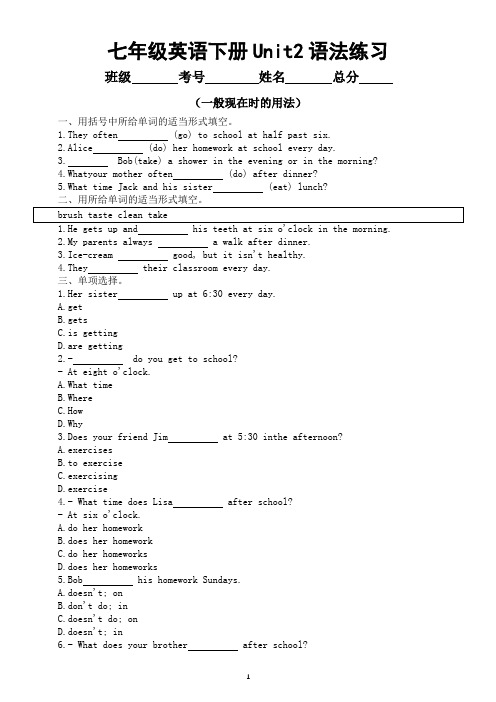
七年级英语下册Unit2语法练习班级考号姓名总分(一般现在时的用法)一、用括号中所给单词的适当形式填空。
1.They often (go) to school at half past six.2.Alice (do) her homework at school every day.3. Bob(take) a shower in the evening or in the morning?4.Whatyour mother often (do) after dinner?5.What time Jack and his sister (eat) lunch?1.He gets up and his teeth at six o'clock in the morning.2.My parents always a walk after dinner.3.Ice-cream good, but it isn't healthy.4.They their classroom every day.三、单项选择。
1.Her sister up at 6:30 every day.A.getB.getsC.is gettingD.are getting2.- do you get to school?- At eight o'clock.A.What timeB.WhereC.HowD.Why3.Does your friend Jim at 5:30 inthe afternoon?A.exercisesB.to exerciseC.exercisingD.exercise4.- What time does Lisa after school?- At six o'clock.A.do her homeworkB.does her homeworkC.do her homeworksD.does her homeworks5.Bob his homework Sundays.A.doesn't; onB.don't do; inC.doesn't do; onD.doesn't; in6.- What does your brother after school?- He usually basketball.A.do; playsB.does; playC.do;playD.does;plays四、句型转换。
人教版七年级下英语期末专项复习语法选择专项训练

人教版七年级下英语期末专项复习语法选择专项训练一、单项选择题1. — ____ is your sister?— She is a doctor.A. WhatB. HowC. WhoD. Where2. I usually go to school ____ bus.A. inB. byC. onD. at3. She ______ music, and she _______ basketball, too.A. likes; likesB. likes; likeC. like; likesD. like; like4. — Can you play basketball?— No, I can't. But I can play ______A. the pianoB. chessC. the guitarD. the violin5. My sister and I _______ TV in the evening.A. am watchingB. watchesC. is watchingD. are watching6. — How often do you visit your grandparents?— I ______ visit them once a month.A. alwaysB. usuallyC. oftenD. never7. There _______ a football match this afternoon.A. hasB. is going to haveC. is going to beD. is going to8. — What _____ your cousin doing in the park now?— She ______ a book under the tree.A. do; readsB. is; readsC. is; is readingD. does; is reading9. Tom usually gets up ____ 6:30 ____ the morning.A. at...inB. at...onC. on...inD. on...on10. — _____ you _____ for school every day?— Yes, I often ______.A. Do; walk; doB. Do; walk; do itC. Are; walking; doD. Are; walking; do it二、完形填空题Once upon a time, a beggar (乞丐) went to ask for food at the door of a house. A __11__ woman was cooking lunch. She gave him a piece of bread and a glass of milk. But as the beggar was about to down them, a dog ran up and __12__ his bread away. Next moment, a cat ran up and drank up his milk. The beggar __13__ nothing to do but sit sadly and watch the animals eating the bread and drinking the milk.Suddenly, a little girl __14__ up and saw the beggar watching. She asked the beggar to __15__ to her home. "You can __16__ there," she said. The beggar went with her to her home. The little girl __17__ the poor old man, and the old man __18__ her. The old man became the old woman's husband. And the little girl had a(n) __19__ "father". From then on, the beggar, the old woman and the little girl lived __20__ and happily in the house.> 11. A. poor B. rich C. young D. old> 12. A. pushed B. brought C. gave D. copied> 13. A. found B. liked C. had D. looked> 14. A. got B. went C. woke D. turned> 16. A. live B. keep C. stay D. move> 17. A. hoped B. asked C. saw D. followed> 18. A. married B. disagreed C. divorced D. hugged> 19. A. new B. old C. little D. big> 20. A. happily B. quietly C. tiredly D. friendly三、阅读理解题Last week, on my way home from school, I saw a girl walking backward. She was about 12 years old, just a little older than me, I think. She was walking slowly and confidently down the street.Just as I was about to pass her, I noticed an unusual thing. She was riding her bicycle on only one wheel!I stopped and looked at her in surprise. She was balancing on one wheel very well, with the rest of her body not touching the ground. But she was going only a short distance, just a few meters at most.Then she jumped off the wheel and came to me."Why did you do that?" I asked."For fun," she answered with a big smile."You can really do it well," I said, "But aren't you afraid of falling off?""Sometimes," she answered. "But if I fall, I just try again. It's not really difficult, you know."I looked at her again, feeling surprised but also a little jealous. I wished I could do that, but I didn't have the same courage.> 21. How old was the girl?> A. About 10. B. About 11.> C. About 12. D. About 13.> 22. What was the girl doing when the writer saw her?> A. She was walking backward.> B. She was riding her bicycle.> C. She was riding her bike on one wheel.> D. She was walking and carrying her bike.> 23. What was the writer doing when the girl came to him?> A. Waiting for her. B. Riding his bike.> C. Talking to somebody. D. Walking home from school.> 24. Why did the girl do that?> A. She wanted to practice riding her bike.> B. She liked to show off to the writer.> C. She wanted to have fun.> D. She wanted to scare the writer.> 25. How did the writer feel?> A. Tired. B. Surprise and a bit jealous.> C. Relaxed.> D. Angry.四、写作题请你写一段话,描述一下你自己 (about myself)。
- 1、下载文档前请自行甄别文档内容的完整性,平台不提供额外的编辑、内容补充、找答案等附加服务。
- 2、"仅部分预览"的文档,不可在线预览部分如存在完整性等问题,可反馈申请退款(可完整预览的文档不适用该条件!)。
- 3、如文档侵犯您的权益,请联系客服反馈,我们会尽快为您处理(人工客服工作时间:9:00-18:30)。
2014人教版七年级下册英语语法综合复习题短语·典句·考点help sb.with sth. 在……方面帮助某人【经典例句】Could you help me with my English?你能帮我学英语吗?【考点聚焦】在help sb.with sth.结构中,with是介词,故后面要跟名词或动名词作宾语。
该结构相当于help sb.do sth.。
【活学活用】8.同义句转换I often help him do his homework.I often help him his homework.be good with... 与……相处得好;与……合得来【经典例句】He is very good with children.他与孩子们很合得来。
【考点聚焦】1)同义词组:get on well with2)注意与be good...的其他词组意思的差别:be good at 意为“擅长做某事”;be good for意为“对……有益处”。
句子·剖析·拓展Can you play the guitar?你能弹吉他吗?【剖析】Can you...?用来询问对方能否做某事,意思是“你能/会……吗?”,肯定回答用“Yes,I can.”否定回答用“No,I can’t.”【拓展】can(能、会),may(可以;可能),must(必须)都是情态动词,后面跟动词原形。
其否定结构在后面加上not,can not通常缩写为can’t;must not缩写为mustn’t;may not一般不缩写。
Can you play the piano,the trumpet,the drums,or the guitar?你会弹奏钢琴,吹喇叭,敲鼓,或者弹吉他吗?【剖析】此句为简单的选择疑问句,即提问者提供两种或两种以上情况,让对方从中作出选择的句子。
它的基本结构是:一般疑问句+or+一般疑问句(后一部分与前一部分相同的成分常常省略)。
or 连接的是两个并列的成分,要求词性一致。
【拓展】1)回答时,不用yes或no,而是选择其中一种回答。
2)在读法上,or的前一部分用升调,后一部分用降调。
语法·聚焦“能”说“会”道的canHi,everyone!I’m “can”.Welcome to come and see my show!【can的才艺展示】1.表示能力,通常指在体力或脑力方面的能力,意为“能;会”。
如:He can speak English.他会说英语。
2.表示许可,意为“可以”,这时可以和may 通用,但是比may较正式。
如:Can I use your pen?我可以用你的钢笔吗?3.表示可能性,意为“可能”,这时常出现在否定句中。
如:It can’t be true.这不可能是真的。
4.表示提供帮助。
如:Can you help me?你可以帮助我吗?当can与动词一起作句子的谓语时,无论主语是第几人称或单数、复数形式,can仍然保持自己的风格,不会发生任何变化。
【can的句式表演】1.肯定句:主语+can+动词原形+其他。
如:Mary can play the drums.玛丽会敲鼓。
2.否定句:主语+can’t+动词原形+其他。
如:He can’t play the piano.他不会弹钢琴。
3.一般疑问句:Can+主语+动词原形+其他?肯定答语:Yes,主语+can.否定答语:No,主语+can’t.如:—Can you play chess?你会下象棋吗?—Yes,I can.是的,我会。
(肯定回答)—No,I can’t.不,我不会。
(否定回答)4.特殊疑问句:疑问词+can+主语+动词原形+其他?如:What can I do for you?我能为你做点什么呢?I、单项选择(25分)( )1. Can you ______ English?A. speakB. talkC. sayD. tell( )2. --- ________ can you play?--- The drums.A. WhenB. HowC. WhatD. Where( )3. --- ______ you sing?--- Yes, I can.A. DoB. CanC. AreD. Am( )4. I want to ______ the chess club.A. joinB. join inC. join toD. join for( )5. Tom wants ________ to you. Are you free?A.to tell B.tells C.to talk D.talks( )6. Can you help me with _______?A. danceB. dancingC. dancesD. to dance( )7. ---What club ______ you want to join?--- Chess club.A. doesB. doC. canD. are( )8. Her sister can play ______ piano, but she can’t play _____ basketball. A.the; the B. /; the C. the; / D. /; /( )9. My brother can play the guitar,______ he can’t play it very well. A. andB. soC. orD. but( ) 10. ---- Can you play volleyball?--- Sorry, I ______.A. don’tB. doC. can’tD. can( )11. --- Are you good ______ your students?--- Yes, I am.A. atB. withC. forD. of( )12. --- Are you ______?--- Yes, I am.A. a musicianB. musiciansC. musicianD. A and B( )13. --- Can he _____ a student?--- Yes. A. is B. be C. are D. does( )14. We want some singers(歌手) ____ our rock band.A. forB. ofC. toD. at( )15. My brother _______ the trumpet and he play it _____ .A. can plays, goodB. can’t play, goodC. can play, wellD. doesn’t play, well( )16.Can you paint? ________.A.Yes, a little B.Yes, little C.No, a little D.No, little( )17.Please call me ________ 8989766.A.in B.at C.about D.with( )18.________ like to go swimming ________ summer.A.Children, on B.Children, in C.A child, onD.A child, in( )19. Can you help me ________ my English?A.with B.of C.learning D.about( )20.What can you do, Lin Tao? ________.A.I like sports B.I want to join the music clubC.I am well D.I can do Chinese Kung Fu( )21.Hi, can I help you? ________.A.Yes, please B.No, I can’t C.Yes, I can D.You are welcome( )22.________ you can ________ our school concert.A.Maybe, in B.Maybe, be inC.May be, in D.May be, be in( )23.We want two good ________ our rock band.A.music for B.musician in C.music in D.musicians for( )24.Little Tom can draw ________.His drawings are very ________.A.good, well B.well, good C.good, good D.well, well( )25.Can he ________ it in English?A.speak B.speaks C.say D, talkB、根据对话内容,选择合适的句子完成对话。
(5分)A: I want some students for the school concert. What can you do, Bill?________(1)B: No, I can’t. But I can play the guitar.A: You can play the guitar! Good. OK, Lily, ____(2)C: I can sing and _________(3)A: You can! Great, Jennifer. _________(4)D: No, I can’t. Victor can play the piano.A: Victor, can you play the piano?E: Yeah, I c an’t sing or dance, ________(5)( )1. A. Can you play the piano? B. Can you sing?C. You can play the guitar.D. Can he play the piano?( )2. A. Can you play the piano? B. Can you sing?C. Can you play the guitar?D. You can play the guitar.( )3. A. I can’t play the drum. B. I can play the drum.C. I can’t play the guitar.D. she can sing.( )4. A. Can you sing? B. Can you play the drum?C. Can you play the piano?D. Can you play the guitar?( )5. A. but I can play the piano. B. and I can’t play the piano.C. but I can play the guitar.D. but I can play the drum.III、完形填空(15分)A. 根据短文内容,选择正确的答案。
